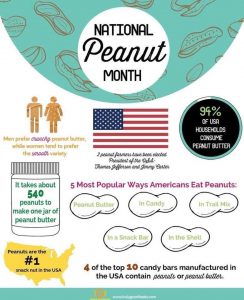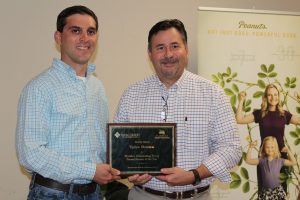
March is National Peanut Month.


![]()

Tyler started farming on his own in 2005, beginning with watermelons but moved to growing peanuts in 2012 on 70 acres and plans to expand. He also maintains a small commercial herd (50) of cattle. He has been working in peanuts all his life. He began working full-time in 2007 with a local peanut and cotton farmer where they farm more than 1000 acres.
He enjoys experiencing the crop progression, from planting a seed in May to the harvest in September. He has always wanted to be a farmer, even though people encouraged him to pursue other options. Growing up surrounded by agriculture in Santa Rosa County has given him a lifelong appreciation for farming.
Tyler is dedicated to serving his community any way he can.
Tyler says farming keeps him busy, but giving back to the community that has helped him is important.
Farming has changed dramatically since he started. Technology, in terms of seed and equipment has become more complicated. He says that environmental concerns have greatly increased, and farmers are actively doing more with less. He says that tightening up pesticide and fertilization application rates have a positive impact for the environment and for the farmer’s bottom line. He is impressed by the accuracy of precision agriculture, and how the planting of peanuts has become more fine-tuned, and how swath control on sprayers saves money, time, and overspray. He readily has adopted Best Management Practices and has signed up through the FDACS BMP program.
He has implemented research-based practices, including nighttime spraying, utilizing recommended varieties, and the Peanut Rx program for disease control. Tyler says the “Most important thing you put in your field is your own shadow.” He scouts his own fields and makes decisions based on what he sees.
With the ever-changing issues facing agriculture, Tyler says that taking advantage of every educational opportunity available is crucial. He attends meetings and conferences, reads trade articles, visits with other producers, and goes online to see the most updated information.
Congratulations to Tyler Brown of Jay, FL as the Farm Credit/FPPA 2018 Young Peanut Farmer of the Year Award winner.
Florida Peanut Produces Association recently held their 43rd Annual Membership Meeting. Many farmers from across the state attended and heard presentations on Association activities, Farm Bill update and a peanut supply and demand update. The highlight of the evening was a presentation given by Bob Parker, President and CEO of the National Peanut Board. Mr. Parker also introduced a new peanut product, Elmhurst Milked Peanuts. While Mr. Parker gave some information on the new product FPPA members served the Milked Peanuts and Milked Peanuts Chocolate to all who wanted to sample it. The majority of the attendees said they like the product and hope to be able to purchase it in local markets soon.
During the meeting Joe Tillman of Altha and Michael Davis of Graceville were elected to serve another three year term on the FPPA Board of Directors. David DeFelix of Campbellton had reached term limits and was recognized for his dedicated service to the Board. Larry Ford of Greenwood was elected to fill the Board seat.
Thanks to the many sponsors, associate members and door prize contributors for helping to make this year’s Annual Meeting a success.